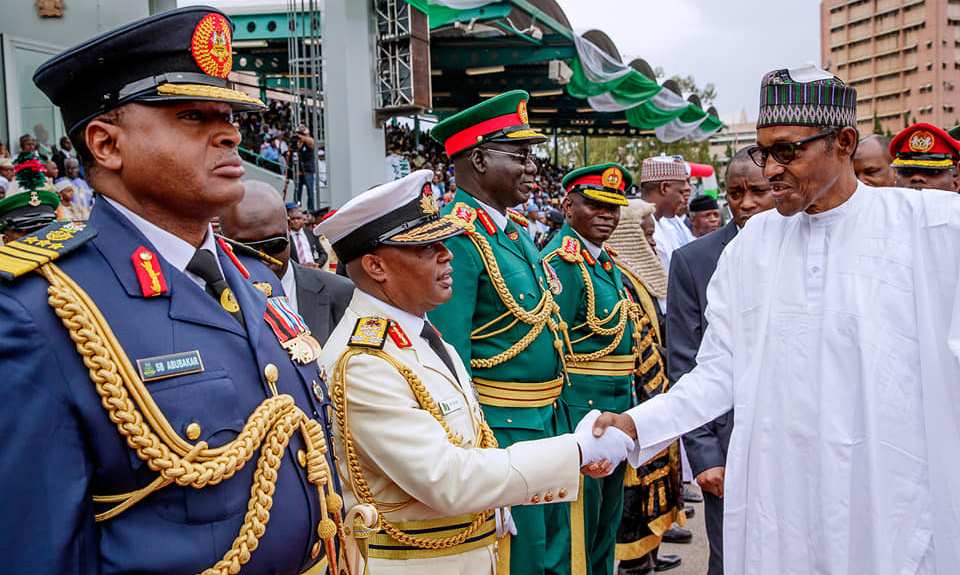By ordinary standard of reasoning, it is a big surprise that all the serving service chiefs in Nigeria have survived being sacked today. Earlier today, the Government itself or was it the media suggested that was what would happen at the end of a meeting between the president and his security chiefs. At the end of the day, they got only presidential reprimand for unacceptable performance.

Major-Gen Babagana Monguno, the NSA in the middle of some of the service chiefs
But those reading meaning to the bearer of the message of the residential reprimand – Major General Babagana Munguno, (retd), the National Security Adviser, (NSA) – are saying it is a significant one and that it might not be too long before the service chiefs leave in tandem with the massive call for them to. This angle to the presidential reprimand as being the first signal of an eventual goodbye sooner than later is predicated on the analysis that there was a force that was protecting the service chiefs to checkmate the NSA. In other words, the ability of the service chiefs to have always survived may not be understood outside of the turf battles within the Villa.
But popular opinion swelled against the service chiefs by the day, concluding that the service chiefs haven’t met basic expectations or minimum benchmarks. One major public criticism of the military heads, one of them at least, is the claim of inadequate troops on ground to defeat Boko Haram, contradicted by the contrary view that there are thousands of soldiers on the ground here and there duplicating Police duties. That is one point held against the head of one of the services. Another one is that the same Army which claims poor funding is building universities.
To make matters worse, the insecurity crisis has reached and remained alarming. There has even been a protest in the president’s home state against the exploits of bandits. When the Sultan spoke at last yesterday on the issue, for instance, he was saying that “By now, an instantaneous pronouncement followed by robust actions should have been made by the government”. Before the Sultan, many have said so in few and not so few words.
The more sensitive contention is the regional lopsidedness in the composition of the security chiefs underlining the perception that the North wants to prolong Boko Haram to harvest political and fiscal gains.

The late President Yar’Adua

Former President Goodluck Jonathan
Critics contrast the present arrangement with anything previously. Under the Obasanjo Presidency from 1999 to 2007, the unwritten principle was appointment of no service chief from any of the three dominant ethnic groups. Although some people saw that as a strategy of using security power to counterbalance political power evenly distributed among the regions viz SW – President; NE – VP; SE – Senate President; NC – Dep Sen President/Party Chair; NW – Speaker; SS – Dep Speaker/SGF, it nevertheless prevented ethnic squabbles about that.
The Yar’Adua regime that followed basically continued the Obasanjo template. Only the Goodluck Jonathan regime is believed to have begun to look at the security apparatuses individually from an inclusion/exclusion paradigm. For instance, he extended appointments into headship of key services to groups that hadn’t held the position. A Southsouth operative thus ended up serving as the head of the DSS, an Igbo headed the Army, Northern Christians headed the services too and so on and so forth.
It is against this background that people are talking of an agenda of consolidating ethno religious hegemony in which fine nationalistic thoughts hold no relevance. To this is added the president’s age as a major problem. “In 2007, a Buhari presidency would have been radically different, although it would still be ethno religious”, opined a Buharite.
There seems to be a consensus that a time comes when certain things just have to be done both in the interest of the government, the officers concerned and overall national health. How and when such things might be done is what is being awaited now!




























